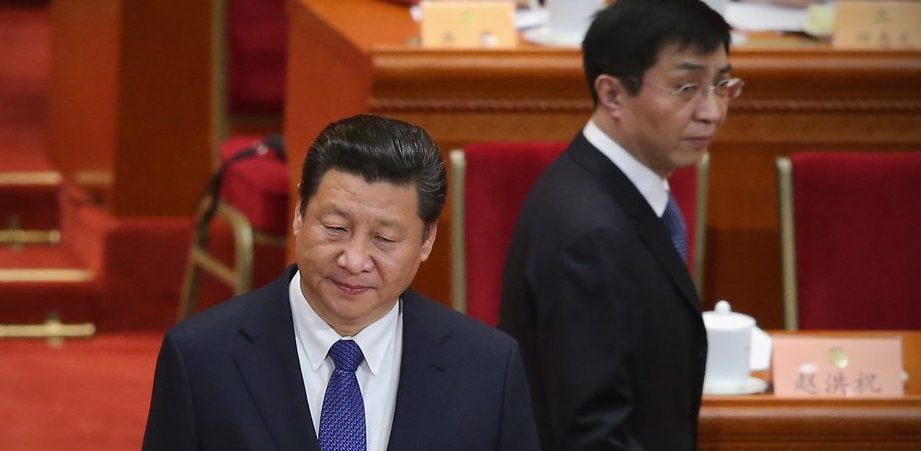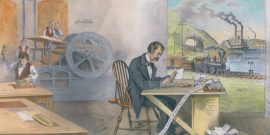Initial steps down the path of equalitarianism in turn create their own momentum, picking up speed and insisting on ever more conformity.
The Chinese Communist Who Understands America
There is a book about America whose author’s identity is as important to Washington, DC as the insights contained in its pages: America Against America, written by Wang Huning in 1989.
Few American intellectuals or politicians know of Wang Huning, notwithstanding that Wang is in charge of China’s propaganda and education, sitting on the fifth seat in the 19th Politburo Standing Committee of the Chinese Communist Party. Few therefore know that Wang has been the center of conversation among overseas Chinese dissidents who colloquially refer to Xi Jinping’s second term as the “Xi-Wang regime”; or that Wang is the brain behind Xi Jinping (2012-) and perhaps also his predecessors Jiang Zemin (1989–2002) and Hu Jintao (2002–12).
Right after Xi assumed office, I noticed something out of the ordinary in China’s political landscape. Almost overnight, the catchy phrase “Chinese Dream,” a rip-off of the term “American Dream,” flooded television, newspapers, the internet, and campuses. Though I cringed to see Xi fumbling through his first formal speech on the Chinese Dream, the way the propaganda apparatus marketed the insipid and seemingly exotic concept made me suspect that some people within that opaque power center must understand Western democracy in general and America in particular.
It is worth noting that though it is Wang’s most famous book, copies are no longer available on Amazon or China’s counterparts such as Taobao, JD.com, or Dangdang. No official English translation is offered. Indeed, the book is as mysterious as its author. One can, however, find an electronic scanned pdf version online.
Democracy in America
In August 1988, Wang—then a professor of international politics at Fudan University, one of the top ten universities in China—embarked on a six-month visit to the U.S. under the auspices of the American Political Science Association. Wang visited 30-plus cities, some 20 universities, and dozens of governmental organizations. He conversed with numerous Americans and foreigners alike. In substantive ways, Wang’s 1988 visit is reminiscent of Tocqueville’s travels in America a century and a half earlier.
Like Tocqueville, Wang’s trip culminated in a book that offers a panoramic view of America, as “a history, a culture, a nation, and a set of systems.” The America Wang depicted is meant to be nothing like the “dogmatic stereotypes” that its partisan antagonists or adherents in China used to peddle. To better understand socialism, we ought to better understand capitalism, notes Wang. America is his case study that allows him to explore “China’s path to power and prosperity.” But Wang also understands that the American polity is a unique product of what he calls “historical-socio-cultural” dynamics.
America fascinated—but did not tempt or intimidate—the young professor (then 33 years old) who spent his teenage years reading foreign literary classics while others (such as Xi) were “sent down to the countryside” during the Cultural Revolution. Wang had been an immensely prolific writer whose work ranged from political theory to political economy and political culture.
America Against America is a very apt title, as it conveys Wang’s overarching impression of a country that he calls “the America phenomenon.” As with “the China phenomenon,” it stands out in the 20th century. To the dispassionate and perceptive academic, America is a paradox, defined by its conflicts and contradictions.
One revealing example that piques Wang’s interest is the eternal tension—or even conflict—between freedom and equality, the two pillars of the American creed. Wang notes freedom is an “elastic” concept, subject to “various interpretations and usages,” driven by “different interests,” whereas equality is “more bounded.” Equality of conditions, when intertwined with freedom, will essentially lead to inequality in outcomes. What the Western (democratic) system guarantees can only be political equality, not economic or social.
The mainstream value, Wang concluded, was freedom. Wang writes, “in an age when individualism prevails, the value of equality can hardly dominate.” This statement runs contrary to the real 21st-century America where advocacy of equality has transmogrified over the past two decades into the demand for equity. This transformation happened in a society where atomized individuals were aggressively severing their bonds to traditions, cultural inheritance, family, and now even biology.
Though Wang did not fully grasp the relations among individualism, liberalism, freedom, and equality, his worry about individualism, which reached a climax in the last chapter entitled The Undercurrents of Crisis, was prescient in another way.
Imprinted with Confucian filial piety, Wang completely objects to the American familial mode which in his view is too individualistic, too contractual, too loose, and extremely lacking in “ren qing wei” (I find it almost impossible to fully translate this Chinese phrase which indicates a personal touch that transcends, or ought to transcend, private boundary). Consequently, Wang notes, family is no longer the cell of American society, “the real cell is the individual.” This means that the American family has lost its societal function of educating the youth, supporting the elder, and ameliorating interpersonal conflicts. Government, therefore, had to take on the role of the nanny.
Wang sees perverted nihilistic individualism as the biggest threat to America because it dissolves the traditional Western value system, and when the value system collapses, Western democracy inevitably dies as well, says Wang.
An erudite academic, Wang’s field trip in America was accompanied and complemented by his broad reading of Western political thinkers from antiquity to modernity such as Aristotle, Augustine, Rousseau, Montesquieu, Hobbes, Locke, Tocqueville, Hegel, Marx, and contemporary writers such as Herbert Marcuse, Henry S. Commager, Samuel P. Huntington, Allan Bloom, Sidney Verba, Theodore Lowi, Robert Dahl, and many others. Little wonder why he was able to penetrate through superficial manifestations and into the essence of the American mind.
American political theorists, political scientists, and policymakers ought to read the book and then ask themselves this question—does anybody in Washington D.C. understand China as deeply and comprehensively?
American Traditions
Freshly off the plane, Wang wrote, “There are two kinds of visitors to America. One is concerned with how to enjoy America, and the other wonders what has made America.”
Wang is obviously among the latter. He interviewed many people for that question. Among many diverse answers such as abundant resources, encouragement of competition, innovative spirit, the Puritan work ethic, and others, Wang found one answer “most abstract and yet most valuable:” “tradition.” Wang thinks it is the time-honored cultural bequest that is fundamental to the development and stability of a society.
In Belmont Massachusetts, Wang observed approvingly what he called America’s “political DNA”—the township self-rule. For Wang, this institution was not only the origin of American governance but still was vibrant when he visited the United States. However, one can argue that Wang failed to recognize that state centralization had by then usurped the rule of the towns.
American localism is exceptional, notes Wang, who says “for any polity to function well, local government must be grounded in its particular history and ideas, and meet the local needs.” By contrast, “uniformity leads to minute adaptability.” Wang continues to note that Belmont township preserves America’s political DNA because what we now call the American experiment is built upon such townships. And the American War of Independence was precisely to preserve its self-rule.
Wang concludes, “political customs” and “political traditions” sometimes are more powerful than laws because “laws are written on paper whereas the former are engraved in hearts and minds.” Hence, Wang argues that it is Americans’ sacralization, as he calls it, of the Constitution that makes it transcend those pieces of yellowed papers to be vibrant and everlasting.
Sacralization is a unique feature that Wang identifies in America’s “colorful national character.” Wang writes, “The American nation does not have a disposition for mystification or deification, but it has a special nature that I call ‘sacralization.’” Wang noticed that Americans tended to sacralize certain qualities or phenomena they saw in politicians, athletes, businessmen, film stars, singers, technology innovators, as well as football games, national ceremonies, the military, and the space shuttle.
“It is of a cultic nature, but it is not a religious cult,” Wang writes, “pragmatic Americans find it hard to worship abstract, legendary, and invisible objects, but they can worship success, bravery, adventure, and wisdom in their own surroundings.” This sacralization of a spirit for Wang is what Rousseau means by “civil religion.” Wang’s following words are particularly illuminating: “The process of sacralization has a fundamental social function, which is to maintain and transmit the core values of society . . . It is here that people’s sentiments, ideas, beliefs, pursuits come into some kind of agreement . . . In such an individualistic, self-centered society, sacralization is the best mechanism for spreading core values.”
Wang did not overlook the religious side of the American mind, though. In a section called God on Earth, Wang discussed another paradox about America. Varied religious organizations and vivacious religious activities play a cohesive role in public life. They are what he called “Soft Administration.” Wang noticed that religion both maintained social order and promoted freedom of society. He concluded that what made religion work in America was its secularization, separation from politics, and non-superstitious nature.
For Wang, core values are fundamental to political stability and social cohesion. Little wonder why the 24-word “Core Socialist Values” have been at the forefront of Chinese propaganda since the 18th National Congress of the CCP (2012).
It seems that stability and cohesion preoccupy the mind of the then political theorist and now politician. That is why he attentively observed and meticulously documented America from the American creed to the gap between ideas and institutions; from neo-conservatism to modern liberalism; from market economy to all-encompassing commodification; from party politics to grass-roots movements; from religion to philanthropy; from political science to public policy and administration; from crime to alienation.
America Against America is a rare candid book about America because Wang wanted to understand the rival of socialism. It is almost impossible to speculate how Wang Huning, the “Emperor’s Teacher,” would advise Xi on how to deal with America, especially given the extreme opaqueness of the CCP regime. But it is alarming that at the center of the regime, a communist understands both America’s strengths and weaknesses. As the author of The Art of War Sun Tzu (544–496 BC) famously says, “If you know both the enemy and yourself, you will fight a hundred battles without danger of defeat.”
American political theorists, political scientists, and policymakers ought to read the book and then ask themselves this question—does anybody in Washington D.C. understand China as deeply and comprehensively?



